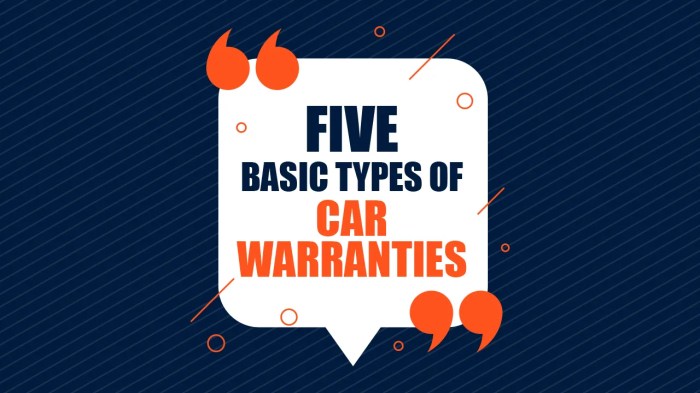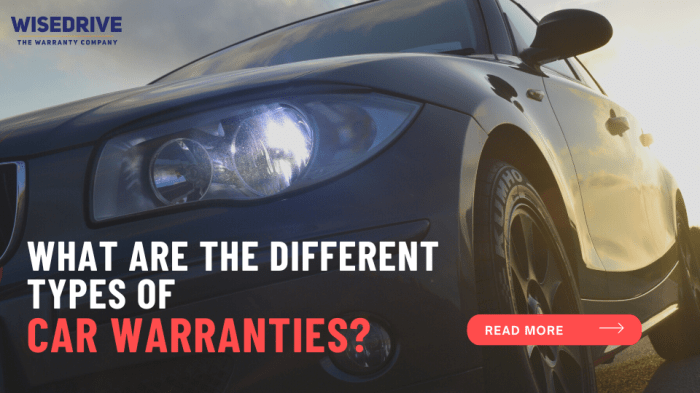Understanding different types of car warranties sets the stage for unraveling the complexities and nuances of various warranty options in the automotive world. Dive into this informative journey to grasp the ins and outs of ensuring your vehicle’s protection.
Explore the realm of warranties, from manufacturer guarantees to extended coverage, and gain a deeper understanding of what each type entails.
Types of Car Warranties: Understanding Different Types Of Car Warranties

When it comes to car warranties, there are several types available, each offering different levels of coverage and protection for your vehicle.
Manufacturer Warranty:
– This type of warranty is provided by the car manufacturer and typically covers defects in materials or workmanship for a specified period or mileage.
– Manufacturer warranties often include bumper-to-bumper coverage for most components of the vehicle.
Extended Warranty:
– An extended warranty is purchased separately and extends the coverage provided by the manufacturer warranty for a longer period of time or mileage.
– Extended warranties can vary in coverage and cost, so it’s important to carefully review the terms and conditions.
Powertrain Warranty:
– A powertrain warranty specifically covers the major components that generate power and make the vehicle move, such as the engine, transmission, and drivetrain.
– Powertrain warranties typically have longer coverage periods than bumper-to-bumper warranties but exclude many other components of the vehicle.
Bumper-to-Bumper Warranty vs. Powertrain Warranty, Understanding different types of car warranties
When comparing a bumper-to-bumper warranty to a powertrain warranty, there are key differences in the coverage provided:
– Bumper-to-bumper warranties offer more comprehensive coverage, including most components of the vehicle, while powertrain warranties focus on specific major components related to the engine and transmission.
– Bumper-to-bumper warranties typically have shorter coverage periods than powertrain warranties, which often last longer due to the nature of the components covered.
Coverage Details

When it comes to car warranties, understanding what is covered and what is not covered is crucial for car owners. Let’s delve into the details of coverage offered by standard manufacturer warranties, extended warranties, as well as common exclusions and limitations.
Coverage under Standard Manufacturer Warranty
Under a standard manufacturer warranty, typically the following components are covered:
- Engine
- Transmission
- Drivetrain
- Electrical systems
- Safety features
Coverage under Extended Warranty
Extended warranties usually cover components beyond what a standard manufacturer warranty includes. Some common components covered by extended warranties are:
- Air conditioning system
- Audio systems
- Suspension components
- Technology features
- Interior components
Common Exclusions or Limitations in Car Warranties
While car warranties provide valuable coverage, there are often exclusions or limitations that car owners should be aware of. Some common exclusions or limitations in car warranties include:
- Wear and tear items such as brake pads and tires
- Maintenance services like oil changes and tune-ups
- Damage caused by accidents or misuse
- Modifications not approved by the manufacturer
- Acts of nature or environmental damage
Warranty Duration and Mileage Limits
When it comes to different types of car warranties, understanding the duration and mileage limits is crucial. These factors play a significant role in determining the extent of coverage and the validity of the warranty.
Importance of Duration and Mileage Limits
- Warranty duration: The duration of a car warranty specifies the period during which the warranty is valid. It can range from a few years to a lifetime, depending on the type of warranty and the manufacturer’s terms.
- Mileage limits: Mileage limits indicate the maximum number of miles a car can be driven while still remaining under warranty. Exceeding this limit can impact the coverage provided by the warranty.
Variation in Warranty Coverage
- Example 1: A basic warranty may cover a vehicle for 3 years or 36,000 miles, whichever comes first. This means that if the car reaches 36,000 miles before the 3-year mark, the warranty expires based on mileage.
- Example 2: An extended warranty may have a duration of 5 years but limit coverage to 50,000 miles. In this case, if the car surpasses the mileage limit before the 5-year mark, the warranty may become void.
Impact of Exceeding Mileage Limits
- Exceeding mileage limits can result in the warranty becoming invalid for certain repairs or replacements. Manufacturers set these limits to control the extent of wear and tear covered by the warranty.
- Regularly exceeding mileage limits may indicate excessive use or neglect of the vehicle, potentially leading to denial of warranty claims for damages that occur due to high mileage.
Transferability and Cancellation
When it comes to car warranties, it’s important to understand the implications of transferability and cancellation. Let’s delve into how these aspects can affect your coverage.
Transferability of Warranties
Some car warranties are transferable to subsequent owners, providing added value when selling a vehicle. This means that the new owner can benefit from the remaining warranty coverage.
For those planning road trips and in need of spacious minivans, there are plenty of options to choose from that offer comfort and convenience for long journeys. Companies like Toyota, Honda, and Chrysler have models that are specifically designed for road trips, providing ample space for passengers and luggage.
To explore the best spacious minivans for road trips, click on this link: Spacious minivans for road trips.
- Manufacturer warranties: Many manufacturer warranties are transferable, offering peace of mind to buyers of pre-owned vehicles.
- Extended warranties: Transferability varies among extended warranties, so be sure to check the terms and conditions.
Process of Transferring a Warranty
Transferring a warranty typically involves notifying the warranty provider and completing the necessary paperwork. The process may vary depending on the type of warranty and provider.
When it comes to the best electric cars in the market, there are several top contenders that are leading the way in terms of innovation and sustainability. Companies like Tesla, Nissan, and Chevrolet have been at the forefront of this revolution, offering models that are not only environmentally friendly but also stylish and high-performing.
To find out more about the best electric cars available, check out this link: Best electric cars in the market.
It’s important to follow the specific instructions provided by the warranty provider to ensure a smooth transfer of coverage.
Conditions for Cancellation or Voiding
Warranties can be canceled or voided under certain conditions, so it’s essential to be aware of these factors to avoid any issues with coverage.
- Failure to maintain the vehicle according to the manufacturer’s recommendations.
- Unauthorized modifications or alterations to the vehicle.
- Failure to disclose pre-existing conditions or issues with the vehicle.
Cost and Value
When it comes to car warranties, the cost plays a significant role in determining their value. Understanding the cost implications of purchasing different types of car warranties is crucial for making an informed decision.
Cost of Extended Warranties
Extended warranties often come with a higher price tag compared to standard manufacturer warranties. While this may seem like an added expense, it is essential to consider the long-term benefits and potential savings that an extended warranty can provide.
- Extended warranties can offer peace of mind by covering repairs and maintenance costs beyond the original warranty period.
- They may help in avoiding unexpected repair bills that could be costly and inconvenient.
- However, it is important to weigh the cost of the extended warranty against the likelihood of needing significant repairs during the coverage period.
Value Proposition of Additional Warranty Coverage
Opting for additional warranty coverage can add value to your vehicle ownership experience by providing comprehensive protection and financial security.
- Additional warranty coverage can enhance the resale value of your vehicle by assuring potential buyers of its well-maintained condition.
- It can also offer benefits such as roadside assistance, rental car reimbursement, and coverage for wear and tear items.
- Moreover, the peace of mind that comes with knowing your vehicle is protected from unexpected repairs can be invaluable.
Final Summary
In conclusion, navigating the realm of car warranties unveils a spectrum of choices and considerations. Equip yourself with the knowledge shared to make informed decisions regarding your vehicle’s protection and maintenance needs.